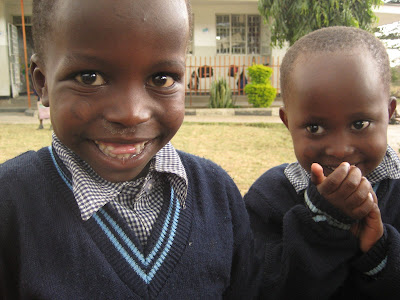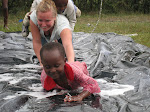
Simply put, I am obsessed with this brother and sister tandem, the only two Maasai in a group of 19 students that TFFT placed in Fikiria Kwanza Academy this September. Just look at them. Possibly the cutest kids in history.
On their applications, their ages were listed as seven and five, respectively. Hunter and I place the real figures at around four and three, reverse Danny Almonte style.
Forget about English, the language du jour in every class at Fikiria Kwanza, an English medium boarding school in Usa River, Tanzania. Lomnyak -- who is the boy, by the way -- knew absolutely no Kiswahili before he showed up for school the first day. Not a word. Not mambo; not poa; not even hakuna matata. Unlike his little sister, who had done a brief stint at some day care center where other children gave her a rudimentary exposure to Swahili, Lomnyak had never been to school. As a Maasai, then, it's almost as if Lomnyak had never even lived in Tanzania, a country in which 120 disparate tribes are all threaded together through a common tongue. Until about seven weeks ago, when TFFT changed all that for him, making friends meant making Maasai friends, and speaking Kimaasai with those Maasai friends.
Coming to Fikiria Kwanza has been quite the transition for the big guy, to say the least.
It's been an even bigger transition for Lomnyak than the one shy little Namayani went through in her first few days, but due to the amazing speed in which Lomnyak has begun to pick up Swahili, they are in basically the same boat at this point. Instead of a hopeless situation in Monduli, where they were being given next to no attention by an unemployed Maasai father, suddenly these kids are now drowning in it, be it as it may that it is attention expressed in Swahili and English. Hope has sprung eternal in two foreign languages for these two. One look at Lomnyak's toothless smile, or a quick glance at Namayani's sheepish grin, could tell you how aware they are of this fact.

Lomnyak is "the hitter," as Hunter and I say. Likes to hit, a lot. He's crazy. Namayani, the shy one, is the complete opposite of the hitter. "Serene;" I like that one-word summary of my little Maasai angel, the kid who makes me want to pull an Angelina Jolie more than any other child at that school. If I could take just one thing home from Tanzania with me in my carry on, it would be Namayani. She's probably fit, too -- the kid is tiny.
As her uncle, the brother of the children's widower father, drove her and Lomnyak to Fikiria Kwanza that first day, she sat crying in the back seat, pleading with him to not drop her upstream (in a new universe) without a paddle. Not old enough to understand how this might be helping her, Namayani was frigid her first two, three days at her new school. But as soon as the frost began to thaw, almost overnight she blossomed, like one of the thousands of bluish purple flowers gracing the branches of the jacaranda trees all over the Arusha region at the moment. Every time I see Namayani these days, instead of a frightened, confused expression, I see a huge smile, always followed by a feet-shuffling, meandering trot, my little Maasai angel fluttering her wings in my direction.
I love our wanafunzi Wamaasai.
Life dealt these kids a rough hand. Their mom died during childbirth; their father isn't quite the caliber of Danny Tanner in his parenting ability. Only the chance encounter between a friend of the children's uncle and Meghann, the one who calls the shots at TFFT, secured them a spot in the Original Nineteen. It would be hard to ever call orphans "lucky" just because they get sponsored to go to a private school, but TFFT is doing its best to even out the scales a bit.
To help these children long term, the gift of education will have to do. I don't have the funds to pull an Angelina just yet.





